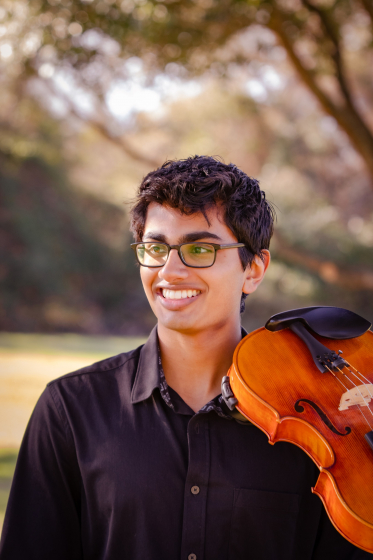Margo Lakin, Trinity Communications
Rohil Watwe cannot remember a time when he didn’t have a deep-rooted passion for healthcare. Drawn to understanding how diseases affect us and the incredible resilience the human body has in overcoming health challenges, his passion intensified in high school as an active member of the Health Occupations Students of America (HOSA) club.
“Those invaluable experiences in HOSA introduced me to various facets of healthcare, from hands-on activities to competitions and seminars, and they pushed me to pursue a career dedicated to improving health outcomes,” he shares.
Majoring in Biology, with a concentration in Cell and Molecular Biology, Watwe is part of the Critical Care and Perioperative Population Health Research (CAPER) Program, working on complementary and integrative health interventions for veteran patients — but he also has a penchant for music that can be traced back to childhood.
“My mother is a classically trained singer, and she first introduced me to music at a young age,” he says. “I’ve played the piano, viola and drums throughout my life, have been part of state-level honor orchestras and served for three years as principal violist with the Houston Youth Symphony.”
His decision to minor in Music followed a conversation with Jonathan Bagg, professor of the practice of Music, during Watwe’s initial application process to Duke. Bagg shared that while most Duke Symphony students weren’t majoring in Music, they were still passionate about the discipline and the arts. The realization resonated with Watwe, who wanted to continue to learn and hone his viola skills while focusing on healthcare.
“What drew me to Duke was the strength of not only the academic fields but also the university’s commitment to the arts,” he explains. “I knew it would be the perfect place for me to matriculate.”

Now, he splits his time as a viola player between the Duke Symphony Orchestra and Duke Sangeet, an Indian classical music student club. Watwe also makes time to play viola and piano as part of Duke Health’s performing arts volunteer program and has created a YouTube channel showcasing his talents.
With an immediate goal to matriculate to medical school and pursue a surgical specialty, his future plans include combining both music and healthcare to improve the outcomes of patients with neurodegenerative diseases.
We sat down with the busy first-year student to learn why he keeps Music in his studies at Duke, the benefits of his STEAM education and how Duke nurtures his interdisciplinary studies.
You’re focused on a career in healthcare, so why is it important to include Music in your course studies at Duke?
Music nurtures creativity and helps develop innovative thinking. This creativity can be a huge asset in STEM fields, encouraging me to think outside the box when approaching complex problems. Integrating music with STEM fosters a well-rounded mindset and offers a different perspective that allows me to make connections across diverse subjects, thus promoting a holistic understanding of the world.
A major in Biology and a minor in Music might seem incongruous to some. Do you find them to be mutually beneficial?
I do. Practicing music requires discipline and focus, qualities also crucial in scientific endeavors. The diligence cultivated in mastering a musical piece translates well into the rigor needed for in-depth scientific study and research.
And Biology courses emphasize organization and structured thinking. Applying this mindset to my music practice has helped me approach compositions with a more organized and systematic method, improving my practice routines and overall progress.
As a STEAM student, do you think Duke provides an environment where a student can study both — and at the same level of scholarship?
Yes. I’ve found that Duke provides a great environment, combining both the arts and STEM, and actively promotes collaborations between both of my fields of study. Initiatives like joint performances, interdisciplinary research projects through Bass Connections and cross-departmental seminars encourage students to explore the intersections between seemingly disparate fields.
I think the diversity of the student body at Duke also helps because it brings together individuals with varied interests and strengths. This fosters a rich exchange of ideas and perspectives, encouraging students to appreciate and explore disciplines beyond their primary focus.